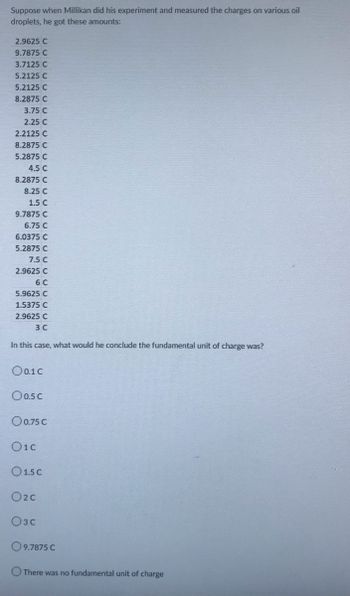Question
Please help me with this questions. Show all your work and the appropriate units
If you can please also help me out with
But if you can just do the word problem

Transcribed Image Text:Suppose when Millikan did his experiment and measured the charges on various oil
droplets, he got these amounts:
2.9625 C
9.7875 C
3.7125 C
5.2125 C
5.2125 C
8.2875 C
3.75 C
2.25 C
2.2125 C
8.2875 C
5.2875 C
4.5 C
8.2875 C
8.25 C
1.5 C
9.7875 C
6.75 C
6.0375 C
5.2875 C
7.5 C
2.9625 C
6 C
5.9625 C
1.5375 C
2.9625 C
3 C
In this case, what would he conclude the fundamental unit of charge was?
00.1 C
00.5 C
O 0.75 C
01C
01.5 C
02c
03C
9.7875 C
There was no fundamental unit of charge

Transcribed Image Text:Two point charges with charges q₁ = 6.7 x 10-6 C and q2 = 6.3 x 10-6 C are initially
very far apart. They are then brought together, with a final separation of 1.5 m.
Calculate how much work, in joules, it takes to bring them together.
Expert Solution
This question has been solved!
Explore an expertly crafted, step-by-step solution for a thorough understanding of key concepts.
Step by stepSolved in 3 steps

Knowledge Booster
Similar questions
- Figure Energy (J) 4- 3 2 1 0- -1 -2 + K₁ + U₁ + W ext = K₁ + Uf + AEth 1 of 1arrow_forwardPlease explain and show work for the following questions with equations used. Thank you!!arrow_forwardPlease work through C D and E (e is very conceptual and I basically understand it so focus if C and D pleasearrow_forward
- Show the complete solution. Please make sure that your handwritten is readable. Thank you.arrow_forwardI need help with this problem, please.arrow_forwardA cat had climbed at the top of the tree. The tree is 20m high and cat weighs 6kg. How much potential energy does the cat have. Attach the units when solving and show the cancellation of units. Show your complete solution and write clearly. Thank you.arrow_forward
- Answer the question in FULL details. Show ALL your steps and work in your calculations. Answer in complete sentences and therefore statements.arrow_forwardPLEASE CNA YOU SOLVE NUMBER 5 SHOWING STEP BY STEP ON A PICTURE. JUST POST THE PICTURE OF YOUR WORK, PLEASE.arrow_forwardShow calculation and write down what is given and known. draw a sketch of the system if needed 1. A 10-g bullet moving horizontally strikes and passes through a 4.0-kg block moving with a speed of 4.2 m/s in the opposite direction on a horizontal, frictionless surface. If the block is brought to rest by the collision, and the bullet emerges with a speed of 320m/s, what is the initial speed of the bullet?arrow_forward
arrow_back_ios
arrow_forward_ios